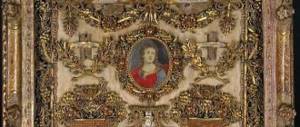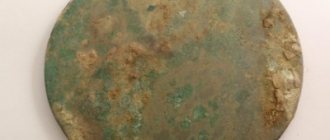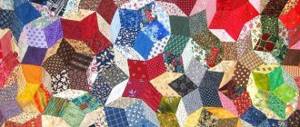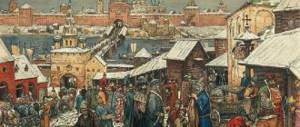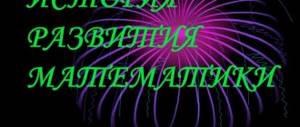Appeal from A.S. Pushkin’s turn to prose was quite natural in the process of development of his creative genius. Pushkin admitted in “Eugene Onegin”: “... Summer is inclined towards harsh prose...”. One of the great prose works of A.S. Pushkin's novel "Dubrovsky". Many researchers of the poet's work point to his incompleteness. However, the incompleteness of a work of art is always relative, “incompleteness does not mean understatement.” When studying the prose of Alexander Sergeevich, it is worth paying special attention to the history of the creation of the novel “Dubrovsky”.
The beginning of the novel
Alexander Sergeevich began work on the novel in 1832. The exact date of the beginning of the creation of the work is known - October 21, since Pushkin himself put dates in the draft as he wrote the novel. The work remained unfinished; the writer stopped working on it in 1833. The novel received the name “Dubrovsky” when it was published after the death of its great author. There are many theories about the reason why Pushkin interrupted the creation of Dubrovsky. Some researchers of his work believe that he abandons work on the novel because he understands that within the framework of the genre of a Western European novel about a noble robber, he cannot solve the artistic problems of Russian life. It is known that the writer's rough notes contained outlines of the contents of the third volume. (Widowhood of Marya Kirillovna, Dubrovsky’s return to his homeland to reunite with his beloved).
Summary of a lesson on literature in the 6th grade based on the novel by A.S. Pushkin “Dubrovsky”
Lesson No. 20
Class – 6
Subject-literature
“Dubrovsky” Vladimir Dubrovsky’s protest against lawlessness and injustice.
The purpose of the lesson:
reveal the originality of V. Dubrovsky’s protest against injustice and lawlessness; find out the reasons for Vladimir Dubrovsky’s protest, form your own attitude towards the novel by A.S. Pushkin’s “Dubrovsky”, to the author’s position, to the heroes of the work.
Pedagogical objectives of the lesson:
contribute to the formation of an idea about A.S.
Pushkin as a prose writer, the author of the novel “Dubrovsky”, a master of artistic expression; create conditions for familiarization with the problems of the work, with the many plot lines of the novel. Lesson type
: setting and solving educational problems
Planned learning outcomes:
Subject:
possess the skills of various types of retellings, understand the role of figurative and expressive language means in creating artistic images of a literary work
Personal:
realize the personal meaning of the teaching; show readiness for self-development.
Metasubject
: cognitive: navigate the textbook, the text of a work of art, answer the teacher’s questions, be able to generalize, draw conclusions;
be able to find the necessary information in a textbook, in the text of a novel Equipment:
portrait of A.S. Pushkin, the epigraph of the lesson is written on the board; presentation for the lesson, cards for the work of each group.
During the classes
I. Organizational moment.
II. Checking homework
A short story about the relationship between K.P. Troekurov and A.G.
Dubrovsky. (Comparative characteristics)
II.Introduction to the topic
1. Guys, have you ever encountered people who act not according to their conscience, unfairly? 2. How do you understand what justice and injustice are? Teacher: So, in life situations you must always act according to your conscience, so as not to tarnish your honor.
Working with a dictionary
- Honor – 1. Moral qualities worthy of respect and pride. 2. A person’s good, unblemished reputation, good name.
- Dishonor - desecration of honor, insult.
3. What do you guys think, what will we talk about today?
IV. Lesson topic message.
“Protest of Vladimir Dubrovsky against lawlessness and injustice”
Epigraph of the lesson
“For conscience and for honor, even one’s head can be cut off” (Russian proverb)
Teacher: Today in the lesson we will analyze the actions of Vladimir, whether he is the heir to his father’s attitude to honor, who protests against lawlessness and injustice, we will create a chain of events that will reveal the character of the hero, his actions, we will answer the problematic question: are the families of Dubrovsky and Troekurova?
Distributive dictation (Distribute by description columns)
1….. did not understand each other. “He is wayward with his daughter. He loves madly: he caters to her whims, but at the same time he is harsh and cruel. She is used to hiding her thoughts and feelings from him.” Father and daughter do not know or understand each other, there is no harmony in this family.
2. This family has shrines that they protect; understand and love each other.
3. In the house ..... there is a portrait of his wife ......, the letters that were written by her during the Turkish campaign are kept. The memory of love is sacredly preserved here.
4. “……I read and forgot everything in the world, plunging my soul into the world of family happiness.” With a feeling of deep tenderness, he recalls his childhood: “I loved family life, managed to enjoy its quiet joys”
5. "……. Although he married for love, having become a widow, he was comforted too quickly.”
6. “... he has a bad time with his own people, but if he gets strangers, he will not only rip off their skin, but also their meat...”
7. “Don’t give us away, and we’ll stand for you”
Kirila Petrovich Troekurov
Andrey Gavrilovich Dubrovsky
1,5,6
2,3,4,7
Conclusion:
The destinies are similar, but the families are different. Andrei could not even imagine that someone else would walk around the house past the portrait of his mother, where he spent his childhood, where he experienced the quiet family joys of a happy life, so he resorts to decisive action.
2. Blitz survey
1. What did Troyekurov want to achieve by taking Kistenevka from Dubrovsky? (break Andrei Grigorievich’s pride)
2. Did he succeed? 3. Why was his celebration poisoned? (He did not expect such an outcome - Dubrovsky’s madness)
4. What do we learn about the condition of Kirila Petrovich from the fourth chapter? (His conscience grumbled, he was not selfish, victory did not please him.)
5. Why, when describing the quarrel between landowners, does A. Pushkin pay so much attention to K. Troekurov? (an unbalanced nature, power-hungry, quick-tempered, but also quick-witted. BUT: Dubrovsky is proud, he could never forgive his offender.)
6 How did Troekurov take the news of taking possession of the estate? (Troekurov was embarrassed: “He was not selfish by nature, the desire for revenge lured him too far, his conscience grumbled. He knew the state of his opponent, the old comrade of his youth, and victory did not please his heart.”) 7. What opposite feelings did Troekurov experience? (“Satisfied revenge and lust for power drowned out to some extent nobler feelings, but the latter finally triumphed.”) 8. Why was the reconciliation of former friends impossible? (The remorse that Troekurov experienced came too late.)
We talk about questions from the textbook for the chapters that were assigned to be read at home (pp. 146-147, part 1).
— How did Troekurov take the news of taking possession of the estate?
Troekurov was embarrassed: “He was not selfish by nature, the desire for revenge lured him too far, his conscience grumbled. He knew the state of his opponent, the old comrade of his youth, and victory did not bring joy to his heart.” — What opposite feelings did Troekurov experience? “Satisfied revenge and lust for power drowned out to some extent nobler feelings, but the latter finally triumphed.” — Why was the reconciliation of former friends impossible? The repentance that Troekurov experienced came too late. Chapter V
After the death of his father, Vladimir Dubrovsky felt spiritual grief.
Pushkin writes that Vladimir’s face was scary, that he could neither cry nor pray. The author does not directly name the feelings that the young man experienced, but we can assume that he became embittered, that he felt a sense of wounded pride and a desire to avenge his father’s death. Christianity commands to forgive your enemies, but Vladimir Dubrovsky did not want to forgive Troekurov and therefore could not pray. — Find and read the episode in which the feelings of Vladimir Dubrovsky are revealed. What technique does the author use to describe the hero’s state? Pushkin conveys Dubrovsky’s experiences by describing the thicket where he went after the funeral. Vladimir walked through the thicket, not making out the road, “...boughs constantly touched and scratched him, his legs constantly got stuck in the swamp, he did not notice anything.” Just as Dubrovsky could not make out the roads in the thicket, so he could not make out his confused feelings: “...thoughts, one darker than the other, were cramped in his soul... He strongly felt his loneliness.” — In the passage describing Vladimir in the thicket of the forest, find the epithets. How do they help the reader understand the character's condition? (From the words: “He finally reached...” to “He felt his loneliness strongly.”) - How do the judicial officials who came to “take possession” of Troekurov behave? (2nd question in the textbook.) Judicial officials, representatives of the law, who came to “take possession” of Troekurov, behave defiantly. They allow shameless statements about Dubrovsky, threaten his peasants, because they feel the strength and power behind them, backed up by Troekurov’s money. The anger and indignation of the peasants grows gradually, but the peasants experience particular indignation when the official insults Dubrovsky himself, the master and legal owner of the estate, and inspires the peasants that their master is Troekurov. First, a voice from the crowd answers the officials, then a murmur rises in the crowd, it intensifies and turns into the most terrible screams. The crowd begins to move. - Find and read the remark of the “voice from the crowd”, the police officer’s response to it and the objection of the same voice. Why was the police officer so indignant at the peasant’s words? — Why doesn’t Vladimir Dubrovsky give angry peasants the opportunity to deal with officials? (4th question in the textbook.) Vladimir Dubrovsky does not allow angry peasants to deal with officials, because he does not want to become a toy in the hands of a crowd of peasants, does not want to become an accomplice in the massacre and hopes for the justice of the tsar. Chapter VI
Vladimir Dubrovsky came to the decision to burn the “sad house” after he saw the portrait of his mother in a new way, read her letters to his father, where she talked about her little son, and heard the voices of clerks who demanded one thing or another, by their presence and behavior, desecrating the bright memory of Dubrovsky’s father and mother.
Let us help schoolchildren see the antithesis in the second paragraph of the chapter: the “world of family happiness” into which Dubrovsky plunged while reading letters from his mother is contrasted with the reality in which Vladimir Dubrovsky sees his father’s trampled honor and the defiant behavior of his clerks. — What prompted the peasants to join Dubrovsky? (2nd question of the textbook.) The peasants joined Dubrovsky because they were outraged that they were going to be commanded and controlled not by natural nobles (whose right to own land and people they considered unshakable), but by clerks, people of ignoble origin. The archipelago blacksmith says: “...have you heard of the matter, the clerks are planning to own us, the clerks are driving our masters out of the lord’s courtyard...” The peasants perceived the insult inflicted on their master as their own insult. - Why does the blacksmith Arkhip destroy clerks, but at the risk of his own life saves a cat? (3rd question in the textbook.) He says to the children who laugh at the pitiful animal: “You are not afraid of God: God’s creation perishes, and you are foolishly rejoicing...” Arkhip perceives the cat as God’s creature, saving which will be a matter pleasing to God, but he does not perceive clerks as people worthy of salvation: in his understanding, they violated the law established by God and the king. By helping Troekurov carry out an unjust trial, they violated God's commandments: they helped one person steal property from another, they lied and broke the oath by which they were obliged to tell the truth. Let us pay attention to the speech characteristics of Arkhip the blacksmith in his conversation with Egorovna: “Arkhipushka,” Egorovna told him, “save them, the damned, God will reward you.” “Why not,” answered the blacksmith.” -Where have we heard these words before? Let us conclude that in the scene with the clerks (Chapter V) the “voice from the crowd” belonged to the blacksmith. Let's look at the illustration by D. A. Shmarinov “Fire in the Dubrovsky estate” (p. 93 of the textbook). - Make up an oral story based on this drawing. In the illustration by D. A. Shmarinov “Fire in Dubrovsky’s estate,” the young gentleman Vladimir Andreevich Dubrovsky is depicted in the center of the picture. It was as if he had just brought a splinter to the hay, which flared up brightly; “The flames shot up and lit up the whole house.” Dubrovsky took off his cap, saying goodbye to his home, and looks at the fire. To his left stands, leaning on his hand, the nanny Orina Egorovna Buzyreva, in a white scarf and apron, with her head sadly bowed. Behind her we recognize the figures of the Dubrovsky serfs: this is the coachman Anton with black hair and beard, the fair-haired Grisha, Yegorovna’s son, and - behind the figure of Anton - the blacksmith Arkhip, who locked the clerks, but at the risk of his life saved a cat from the roof of a burning barn . On the left we see the flames of the fire. The flames are reaching towards Dubrovsky. There are horses standing in the background, above a group of people, sparks from the fire flying towards the black sky. Dubrovsky's entire figure expresses pride and a sense of inner dignity. The figures of the serfs express a gloomy determination to follow their proud master: “... we will die, we will not leave you, we will go with you.” II. Commented reading . Working with illustrations. Chapter VII
Students read Chapter VII.
Commenting on the chapter, let’s say that Vladimir Dubrovsky was forced to become a robber by the death of his father and lack of means of livelihood, but the main reason was that, knowing the greed and corruption of officials, he lost hope of a fair court decision and did not even hope to find protection from the tsar, because that for this money was needed, but Dubrovsky did not have it. Chapter VIII
A student who has completed an individual task reads expressively Chapter VIII or the episode “Deforge in the bear’s room” (with the words: “In Kirila Petrovich’s yard...”).
— What meaning does the author put into the expression “the noble amusements of a Russian master”? — What qualities did Deforge show in the bear room? — What fact made an indelible impression on Marya Kirilovna? How did Marya Kirilovna’s attitude towards Deforge change? Homework
Prepare an expressive reading of Chapters IX-XI. Answer the textbook questions for the relevant chapters (pp. 147-148).
1. Problematic question “Are families similar?
Kirila Petrovich Troekurov
Andrey Gavrilovich Dubrovsky
3.Episode analysis
Group I Read the description of the autumn landscape and answer the questions
. Compose TEXT. Present your work to the class. 1. What kind of life did Andrei lead in St. Petersburg? (Vladimir “was brought to St. Petersburg in the eighth year of his age”, “was brought up in the cadet corps and was released as a cornet into the guard; his father did not spare anything for his decent maintenance, and the young man received from home more than I should have expected.”) 2. What does autumn symbolize in this episode? What role does the landscape play here? (Nature reflects the hero’s state of mind. A cold day, half-naked trees, branches that scratch his face, a stream carrying away a few faded leaves - everything speaks of the hero’s loneliness 3. How do you think the death of his father and the autumn falling leaves symbolize the end of life in this episode? 4. What feelings does Vladimir experience? (loneliness, a feeling of spiritual impasse, life is passing...)
Find the epithets in this episode. How do they reveal the hero's condition? (Epithets are written on yellow pieces of paper that are hung on the tree of KNOWLEDGE) CONCLUSION:
The death of his father and the news from his nanny forced Vladimir to grow up. He behaves decisively and independently. After the death of his father, Vladimir Dubrovsky felt spiritual grief. Pushkin writes that Vladimir’s face was scary, that he could neither cry nor pray. The author does not directly name the feelings that the young man experienced, but we can assume that he became embittered, that he felt a sense of wounded pride and a desire to avenge his father’s death. Christianity commands to forgive your enemies, but Vladimir Dubrovsky did not want to forgive Troekurov and therefore could not pray.
Group I Fire scene. Retell the scene of the fire and answer the questions. Write a TEXT of your speech and present the group’s work to the class
1. How did Dubrovsky’s peasants behave when the judicial officials came to take away the estate? (They tried to start a riot.) 2. How does Dubrovsky behave? (Vladimir stops the peasants, promises to ask for mercy from the sovereign.) 3. How does this characterize him? (Dubrovsky acts nobly, saving peasants from punishment, and officials from reprisals.) 4. What feelings does Dubrovsky experience in his father’s house, where judicial officials are in charge? What does he decide to do? (He worries that he will have to leave his home to the one who is responsible for the death of his father, the one who ruined his family. Vladimir decides to burn the house.)
Teacher's word
. Judicial officials, representatives of the law, who came to “take possession” of Troekurov, behave defiantly. They allow shameless statements addressed to Dubrovsky, threaten his peasants, because they feel the strength and power behind them, backed up by Troekurov’s money. The anger and indignation of the peasants grows gradually, but the peasants experience particular indignation when an official insults Dubrovsky himself, the master and the rightful owner of the estate , and convinces the peasants that their master is Troekurov. First, a voice from the crowd answers the officials, then a murmur rises in the crowd, it intensifies and turns into the most terrible screams. The crowd begins to move.
- Find and read the remark of the “voice from the crowd”, the police officer’s response to it and the objection of the same voice. Why was the police officer so indignant at the peasant’s words?
— Why doesn’t Vladimir Dubrovsky give angry peasants the opportunity to deal with officials? (4th question of the textbook.) (Vladimir Dubrovsky does not allow angry peasants to deal with officials, because he does not want to become a toy in the hands of a crowd of peasants, does not want to become an accomplice in the massacre and hopes for the justice of the tsar. Takes responsibility for others, this is an Act A person, not a young man, living off his father's money.) The attitude of the peasants towards Vladimir. The motives for the behavior of Vladimir, the leader of the robbers? Write a TEXT of your speech and present the group’s work to the class
1..Why did the courtyard peasants follow Dubrovsky? (Firstly, they were devoted to their master, and secondly, they understood perfectly well that Troekurov would deal with them. The peasants joined Dubrovsky because they were indignant that they were going to be commanded and disposed of by non-natural nobles (whose right to own land and people they considered unshakable), and clerks, people of ignoble origin. Arkhip the blacksmith says:
“...have you heard of the matter, the clerks are planning to own us, the clerks are driving our masters out of the master’s court..." An insult inflicted on their master , the peasants perceived it as their own insult.)
2. What idea of the leader of the robbers had developed in the area? (That he was a brave, intelligent and generous man.) 3. Why did the robbers not touch Troekurov’s house? (Troekurov thought that his house was not being touched because for the fear that he instilled in everyone in the area. But we understand that he is mistaken. This is how Pushkin wanted to intrigue the reader.) 4. What circumstances forced Dubrovsky to become a robber? (He was driven by a sense of revenge, a desire to avenge injustice and cruelty, because . he lost everything: his home, his position in society, his fortune.)
VI. Let's consider the diagram that is in front of you: The values of the Dubrovskys - the lawlessness of Troekurov and company?
Teacher: Vladimir protests against lawlessness and injustice, but at the same time he himself becomes a robber committing lynching. The author is clearly on the hero's side. A. Pushkin shows Dubrovsky as a noble, honest man who defends justice. The idea of the work is that the main human values are justice, honor and loyalty to one’s word. We will talk about this in the next lesson. And today let's try to answer the problematic question: 1. Does the hero deserve respect?
2. Will the hero refuse revenge? What factors will influence this decision? What could change his decision?
VII. Reflection of activity
Continue the sentence
“Reading Pushkin...”
“My sympathies are with this hero, because...”
“It’s hard to come to terms with the fact that...”
IX. Homework
Prepare a retelling of the episode “Lunch in Pokrovsky” from the perspective of one of the characters
Answer in writing question No. 1 (chapter VII) page 139
3
Real prototypes of the main character
The work was based on a story that Pushkin heard from his friend about the poor nobleman Ostrovsky, whose estate was seized by a wealthy neighbor who had enormous influence in local society. Ostrovsky was left penniless and was forced to become a robber. Together with his peasants, he robbed rich landowners and officials. Later he was captured and put in prison. It was there that Pushkin’s comrade Nashchokin met him. This story served as the basis for creating the plot line of the novel. This version is supported by the fact that initially in his drafts Pushkin gave the main character the surname Ostrovsky.
Second version
says that Dubrovsky’s prototype was Lieutenant Muratov, whose story Pushkin learned while in Boldin. The Novospasskoye estate, which belonged to the Muratov family for seventy years, was recognized as the property of Lieutenant Colonel Kryukov, whose father at one time sold it to Muratov’s father. The court made this decision based on the fact that the accused could not provide any papers proving his legal right to own the estate, since they were lost in a fire, and Muratov never filed an appeal against the verdict. The trial lasted for many years and was decided in favor of the influential plaintiff Kryukov.
About the novel "Dubrovsky"
A. S. PushkinThe novel “Dubrovsky” was created by Pushkin in 1832-1833. The title does not belong to Pushkin and was given by the publishers after the name of the main character. The plot of this work was based on the story of Pushkin’s close friend P.V. Nashchokin “about one Belarusian poor nobleman named Ostrovsky (as the novel was originally called), who had a lawsuit with a neighbor for land, was forced out of the estate and, left with only peasants , began to rob first the clerks, then others.” Nashchokin saw Ostrovsky in prison. Pushkin was aware of similar affairs of the Nizhny Novgorod landowners Dubrovsky, Kryukov and Muratov, as well as the morals of the owner of the village of Petrovskoye P. A. Hannibal.
In the original plan of the novel, there was no Dubrovsky’s father and the story of his friendship with Troekurov, there was no discord among the lovers, there was no figure of Prince Vereisky, very important for the idea of stratification of the nobility (aristocratic, but poor; noble, but rich). In addition, in the novel, Dubrovsky becomes a victim of betrayal, and not of prevailing circumstances. It outlines the story of an exceptional personality, daring and successful, offended by a rich landowner, by the court and avenging himself.
In the text that has come down to us, Pushkin, on the contrary, emphasized the typicality and ordinariness of Dubrovsky, with whom an event characteristic of the era happened. Dubrovsky in the story is not an exceptional person. It is connected with the whole way of life of that time. Dubrovsky and his peasants, like the landowner Ostrovsky in life, found no other way out than robbery, the robbery of offenders and rich noble landowners. This topic has been widely developed in Western and Russian literature.
The novel takes place in the 1820s. The novel presents two generations - fathers and sons. The life history of the fathers is compared with the destinies of the children. The story of the fathers’ friendship is a harbinger, “a prelude to the tragedy of children.”
Initially, Pushkin named the exact date that separated the fathers: “The glorious year 1762 separated them for a long time.
Troekurov, a relative of Princess Dashkova, went uphill.” These words mean a lot. Both Dubrovsky and Troekurov are people of Catherine’s era, who began their service together and strived to make a good career. 1762 is the year of Catherine’s coup, when Catherine II overthrew her husband Peter III from the throne and began to rule Russia. Dubrovsky remained faithful to Emperor Peter III, like the ancestor of Pushkin himself (Lev Alexandrovich Pushkin).
Troekurov, on the contrary, sided with Catherine II, who brought him closer to her. Since then, the career of Dubrovsky, who did not betray his oath, began to decline, and the career of Troekurov, who betrayed his oath, went uphill. Troekurov belonged to that new serving noble nobility, which, for the sake of ranks, ranks, titles, estates and awards, knew no ethical barriers. Dubrovsky - to that ancient aristocracy that valued honor, dignity, and duty above any personal gain. Consequently, the reason for the demarcation of the nobility and the quarrel between the two landowners lies in historical circumstances and in the morals of the heroes.
A lot of time has passed since Dubrovsky and Troekurov separated. They met again when both were out of work. Troekurov and Dubrovsky did not become enemies. On the contrary, they are connected by friendship and mutual affection, but these strong human feelings are not able to first prevent a quarrel and then reconcile people at different levels of the social ladder, just as their children who love each other, Masha Troekurova and Vladimir, cannot hope for a common fate Dubrovsky.
This tragic idea of the novel about the social and moral stratification of people from the nobility and the social enmity of the nobility and the people is embodied in the completion of all plot lines. It gives rise to internal drama, which is expressed in the contrasts of the composition: friendship is opposed by the court scene, Vladimir’s meeting with his native nest is accompanied by the death of his father, struck down by misfortunes and a fatal illness, the silence of the funeral is disturbed by the menacing glow of a fire, the holiday in Pokrovskoye ends with a robbery, love - with flight, wedding - battle. Vladimir Dubrovsky inexorably loses everything: in the first volume, his patrimony is taken away from him, he is deprived of his parental home and familiar society, the socio-cultural environment in which he lived before. In the second volume, Vereisky takes away his love, and the state takes away his robber will. Thus, human feelings enter into a tragic duel with the prevailing laws and morals.
End >>>

